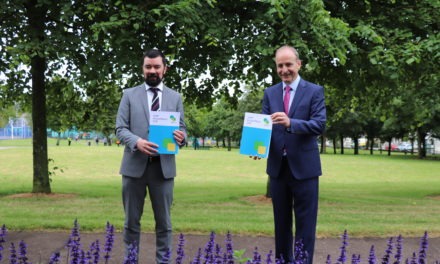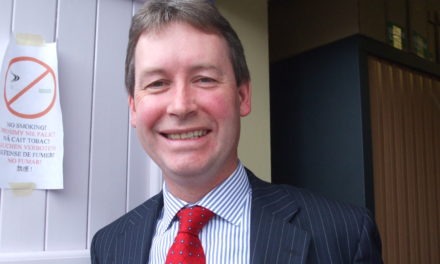Minister for Rural and Community Development Michael Ring officially launched the Social Inclusion and Community Activation Programme (SICAP) in Limerick on 20 April.
On 20 April, Minister for Rural and Community Development Michael Ring arrived in Limerick for an important event: the national launch of the new Social Inclusion and Community Activation Programme (SICAP).
The dual launch took place in two Limerick communities representing urban and rural areas that benefit from the programme: Southill in the city and Ballybrown in the county.
Minister Ring described SICAP as a “major investment by the government to tackle disadvantage in Ireland”.
The €190 million spend will run from this year until 2022.
“This announcement demonstrates the government’s commitment to tackle poverty and social exclusion in the most disadvantaged areas for the next five years,” said Minister Ring.
“Working at a local level with community groups and individuals, SICAP funding supports life-long learning, strengthens communities and helps people to become job ready.
“By providing practical guidance and supports, the programme helps disadvantaged people throughout the country to make progress in their lives and to realise their potential,” he said.
The programme supports unemployed people, people living in deprived areas, people with disabilities, single-parent families, people on low income, members of the Traveller and Roma communities, and other disadvantaged groups.
What is SICAP?
SICAP is co-funded through the European Social Fund and is overseen nationally by the Department of Rural and Community Development. Pobal provides administrative support nationally.
It is overseen at “lot” level (often a county) by local community development committees (LCDCs), while it is implemented at community level by the staff of local development companies, such as Partnerships or LEADER companies.
The programme follows in the train of earlier programmes stretching back to the early 90s, all aimed at tackling poverty in collaboration with communities. These include the Local and Community Development Programme, the Local Development and Social Inclusion Programme, and the Community Development Support Programme.
There was often resistance when programmes ended, but for community groups to continue to receive funding, they generally gave in to pressure to go along with what came from the top down.
On this occasion, it is different. The redesign of SICAP – SICAP 2, as it is known by people working in the sector – took on board the majority of the observations and recommendations that came from the grassroots up.
The changes introduced for the current programme were welcomed far and wide.
While the funding for earlier programmes was at times higher than for SICAP, the programme has (since 2015) established a record for itself in “helping disadvantaged people to make progress in their lives”.
The government sees it as being more efficient.
Speakers at the dual launch included Minister Michael Ring; Patrick O’Donovan, TD; Tom Neville, TD; Cllr Stephen Keary, Mayor of Limerick City and County Council; Cllr Jerome Scanlon, chairperson of Limerick’s LCDC; and Shay Riordan, CEO of West Limerick Resources.
We asked people involved in the delivery of SICAP around the country what they made of the new programme.
Meath
Michael Ludlow, CEO of Meath Partnership, said he and his team are “very happy this time around”.
“We’re very happy with this SICAP in comparison to the last SICAP programme.
“It allows us to engage more with the individuals who are meant to benefit from SICAP.
“It’s more focused on doing quality work for individuals who need assistance, rather than achieving numbers and targets with minimal impact on the beneficiary,” said Ludlow.
Mayo
Gerry O’Neill, CEO of South West Mayo Development Company, was pleased with changes to the programme, but he criticised the decision to put the work out to public tender.
“The fact that we’re through the second tendering process is a relief, obviously, for us all. Having done it once, it was easy to do the second time, but these programmes should not be in that space – they shouldn’t be tendering.
“Having said that, we’re where we are now. The new programme has been simplified in that there are two goals rather than three.
“And the fact that the targets are reduced a bit enables us to work more intensively with less people, rather than working under pressure with regard to meeting targets.
“In our case, the main priority remains with individuals, with younger people and with what would be classically called ‘NEETs’ [people who are not in education, employment or training].
“From the community side, there would be a lot of rural isolation. We’re also looking to put more effort into supporting social economy projects,” he said.
Donegal
Jim Slevin and colleagues from Donegal Local Development Company travelled the furthest for the national launch.
Slevin said SICAP had been “streamlined and is doing everything that it should be doing, so we’re very happy with it at this point in time. It is working very well for us”.
North Tipperary
Caroline Shanahan, from North Tipperary Leader Partnership, said: “I work as a project worker on SICAP. We do work sometimes that never gets seen or heard of, and I enjoy working on it.
“Overall, I think it’s a great programme. I’m glad they made some changes from the last programme. I just feel it might be easier to work with,” she said.
Limerick – LCDC perspective
Newcastle West-based Fine Gael councillor Jerome Scanlan is the chair of the LCDC in Limerick. He said SICAP was “fantastic” and had “delivered very well for Limerick through our three LEADER companies: West Limerick Resources, Ballyhoura Development, and the PAUL Partnership”.
He said it was “absolutely fitting” that Minister Ring conducted the launch in Southill.
Limerick – a worker’s perspective
Maeve Gorden is with St Mary’s Aid, based in Limerick city’s King’s Island.
She said: “It’s lovely to see that the consultation that was done over the past few years was taken into account. There’s a move towards the bottom-up approach in allowing communities to grow with the programme.
“And it’s open now to more people; it’s not as closed to target groups. It’s open to older people, and reaching out and recognising the needs of women as well. They’re all good changes. It’s going in the right direction.”
National perspective – the ILDN
The Irish Local Development Network (ILDN), whose members implement SICAP across the state, welcomed the new programme and its design. Chairperson Marie Price-Bolger said: “It will allow our members, whose approach is community-based and community-led, to advance the social inclusion needs of disadvantaged individuals and groups on a planned basis over the next five years. The ILDN looks forward to supporting our members in their delivery of the programme.”
National perspective – Pobal
Pobal’s CEO, Denis Leamy, welcomed the fact that SICAP 2018-2022 will have “an increased focus on targeting the most disadvantaged individuals and communities, using community development approaches, more intense engagement, and greater collaboration with other agencies”.
Interested in reading more about the state of Ireland’s community development sector? Check out our latest issue.





